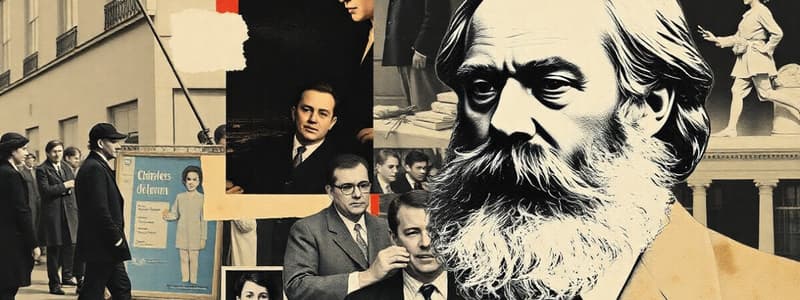Podcast
Questions and Answers
Which concept refers to the ability to perceive the connection between individual experiences and larger social forces?
Which concept refers to the ability to perceive the connection between individual experiences and larger social forces?
- Social order
- Sociological imagination (correct)
- Social structure
- Socialization
What does functionalism theory primarily focus on within social systems?
What does functionalism theory primarily focus on within social systems?
- Fulfilling individual desires
- Social stability and cohesion (correct)
- Conflict between social classes
- The evolution of cultures
Which research method focuses on numerical data and statistical analysis?
Which research method focuses on numerical data and statistical analysis?
- Ethnography
- Quantitative method (correct)
- Qualitative method
- Participant observation
What does the concept of culture as a social construction emphasize?
What does the concept of culture as a social construction emphasize?
Which agent of socialization includes family, schools, and peers?
Which agent of socialization includes family, schools, and peers?
Which theory emphasizes the role of conflict and power dynamics in social change?
Which theory emphasizes the role of conflict and power dynamics in social change?
What term refers to the expectations and norms surrounding behaviors based on one's biological sex?
What term refers to the expectations and norms surrounding behaviors based on one's biological sex?
What is one of the key consequences of informal deviance in society?
What is one of the key consequences of informal deviance in society?
Flashcards are hidden until you start studying
Study Notes
Key Characteristics of Modern Society
- Industrialization: Shift from agrarian to industrial economies, mass production, technological advancements
- Urbanization: Population shift from rural to urban areas, growth of cities
- Individualism: Emphasis on personal autonomy, self-reliance, and individual achievement
- Rationalization: Increasing emphasis on efficiency, logic, and calculability
- Bureaucratization: Formal organizations with hierarchical structures and specialized roles
- Consumerism: Emphasis on consumption as a source of identity and fulfillment
- Globalization: Interconnectedness of societies through trade, communication, and cultural exchange
- Information Revolution: Rapid development and global dissemination of information through technology
Theorists' Views on Societal Change
- Karl Marx: Conflict Theory - Change driven by class struggle, with the dominant class exploiting the working class. Revolution is inevitable.
- Max Weber: Rationalization and Bureaucratization - Change driven by increasing rationality, efficiency, and formal organizations in society.
- Emile Durkheim: Functionalism - Change driven by the need to maintain social order and stability, where different social institutions contribute to societal functions.
Sociological Theories
- Functionalism: Views society as a complex system with interconnected parts that work together to maintain stability and order. Emphasizes consensus and shared values.
- Conflict Theory: Views society as characterized by conflict, inequality, and power struggles between different groups. Emphasizes the role of power and resources in shaping social relations.
Key Sociological Concepts
- Sociological Imagination: Ability to see the connection between personal troubles and broader social issues.
- Social Structure: Patterns of social relationships and institutions that shape individual behavior and actions.
- Social Construction: Ideas or concepts that are created and maintained through social interactions, not inherent or natural.
- Social Order: Shared norms, values, and expectations that maintain a society's stability.
- Socialization: Process of learning the norms, values, and behaviors of a society and developing a sense of self.
- Agency: Ability of individuals to make choices and act independently within the constraints of social structures.
Social Science Research
- Social science knowledge is systematic and objective, seeking to explain and understand the social world.
- Everyday knowledge: Based on personal experiences, common sense, and cultural beliefs. It can be biased and limited.
- Social science research: Based on rigorous empirical methods and data analysis, aiming for objectivity and scientific rigor.
Research Methods
- Quantitative method: Uses numerical data and statistical analysis to test hypotheses and identify patterns.
- Qualitative method: Uses textual, visual, or audio data to understand meanings, experiences, and perspectives.
Strengths and Limitations
- Survey: Strengths: Large sample size, efficient data collection. Limitations: Can be superficial, limited to pre-determined questions.
- In-depth Interviews: Strengths: Rich and detailed data, allows for exploration of individual perspectives. Limitations: Time-consuming, potential for bias, limited sample size.
- Non-participant Observation: Strengths: Observers can remain objective, allows for study of natural behavior. Limitations: Limited ability to interpret meaning, potential for researcher bias.
- Participant Observation: Strengths: In-depth understanding of a group's culture and practices. Limitations: Time-consuming, ethical considerations, potential for researcher bias.
- Ethnography: Strengths: Comprehensive and holistic understanding of a culture or group. Limitations: Time-consuming, potential for researcher bias, limited generalizability.
Research Ethics
- Principles guiding ethical conduct in research, ensuring the safety, welfare, and dignity of research participants.
- Why necessary: Protect individuals, ensure accuracy of findings, and maintain public trust in research.
Culture
- Culture: Shared beliefs, values, norms, symbols, and practices of a particular group.
- Components:
- Material Culture: Physical objects and artifacts (clothing, tools, technology)
- Non-material Culture: Ideas, beliefs, values, and norms (religion, language, customs)
- Symbols: Objects, words, or actions that have a shared meaning.
- Role of Culture: Shapes social behavior, provides a sense of identity, and facilitates social order.
- Culture as Inheritance: Passed down through generations, traditions, and institutions.
- Culture as Social Construction: Dynamic and evolving through social processes and interactions.
Culture vs. Biology
- Sociological explanations of human behavior focus on the role of culture, socialization, and social forces.
- Biological explanations emphasize genetic and biological factors.
Culture as Freedom vs. Constraint
- Freedom: Culture can provide opportunities for expression, creativity, and personal growth.
- Constraint: Culture can also limit individual choices and behaviors, enforcing conformity to social norms.
Socialization
- Socialization: Process of learning and internalizing norms, values, and behaviors of a society.
- Purpose: Develop a sense of self, social skills, and conformity to social expectations.
- Primary Agents: Family, school, peers, media, religious institutions.
- Personal Identity: Individual beliefs, values, and characteristics.
- Social Identity: Role and status within a society based on social group memberships (gender, ethnicity, class).
- Sanctions: Rewards or punishments used to enforce social norms.
- Mead's Theory of Taking on the Role of the Other: Process of learning to see oneself from the perspective of others, developing a sense of self and social consciousness.
Working-Class vs. Middle-Class Parenting
- Concerted Cultivation (Middle-Class): Actively nurturing and developing children's talents and skills through structured activities and organized experiences.
- Accomplishment of Natural Growth (Working-Class): Emphasizing independence, autonomy, and resilience, allowing children more unstructured time and freedom.
The Mask you Live In
- Gender Norms: Socially constructed expectations about what behaviors, roles, and characteristics are appropriate for men and women.
- Sources: Family, media, peers, social institutions.
- Consequences: Can limit opportunities, create pressure and stress, and contribute to violence and inequality.
Deviance
- Social Control: Mechanisms used to regulate behavior and maintain social order.
- Deviance: Violation of societal norms and expectations.
- Informal Deviance: Minor violations of social norms (disregarding fashion trends, breaking a social rule).
- Formal Deviance: Violations of formal laws (crimes).
- Social Construction: Deviance is not inherent but defined and shaped by social processes, norms, and power relations.
Arguments for and Against Deviance
- For Deviance:
- Social Change: Deviance can challenge existing norms and lead to positive social change.
- Innovation: Deviant behavior can lead to new ideas and discoveries.
- Against Deviance:
- Harm to Individuals: Deviant behavior can lead to physical or emotional harm for individuals or society.
- Disruption of Social Order: Deviance can disrupt the stability and safety of society.
Theories of Deviance
- Durkheim's Functionalism: Deviance helps reinforce societal norms and values by highlighting what is acceptable.
- Merton's Strain Theory: Deviance arises from social strains when individuals lack the means to achieve cultural goals.
- Conflict Theory: Deviance is a product of power imbalances between social groups.
- Labeling Theory: Deviance is a result of social labels and stereotypes that are applied to individuals.
- Control Theory: Deviance occurs when social controls over individuals are weakened, allowing them to engage in deviant behavior.
Studying That Suits You
Use AI to generate personalized quizzes and flashcards to suit your learning preferences.




